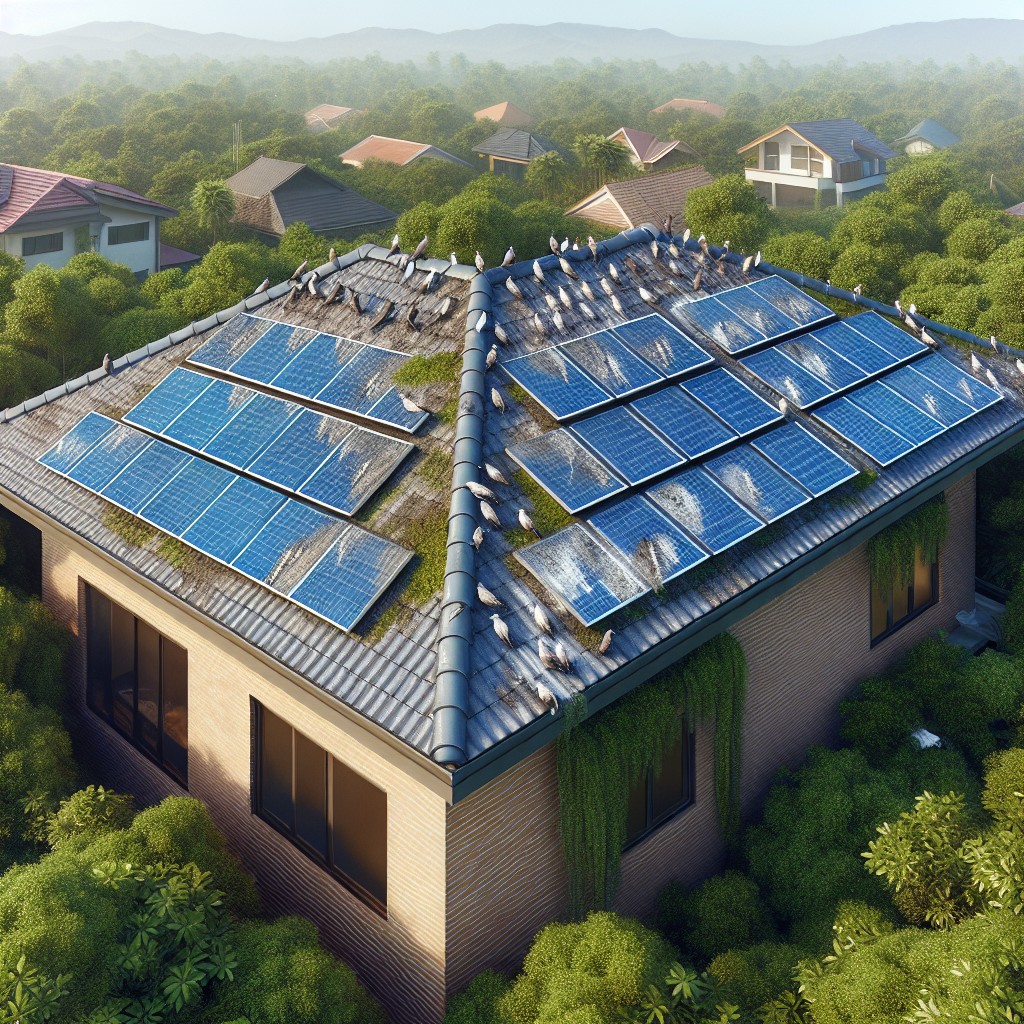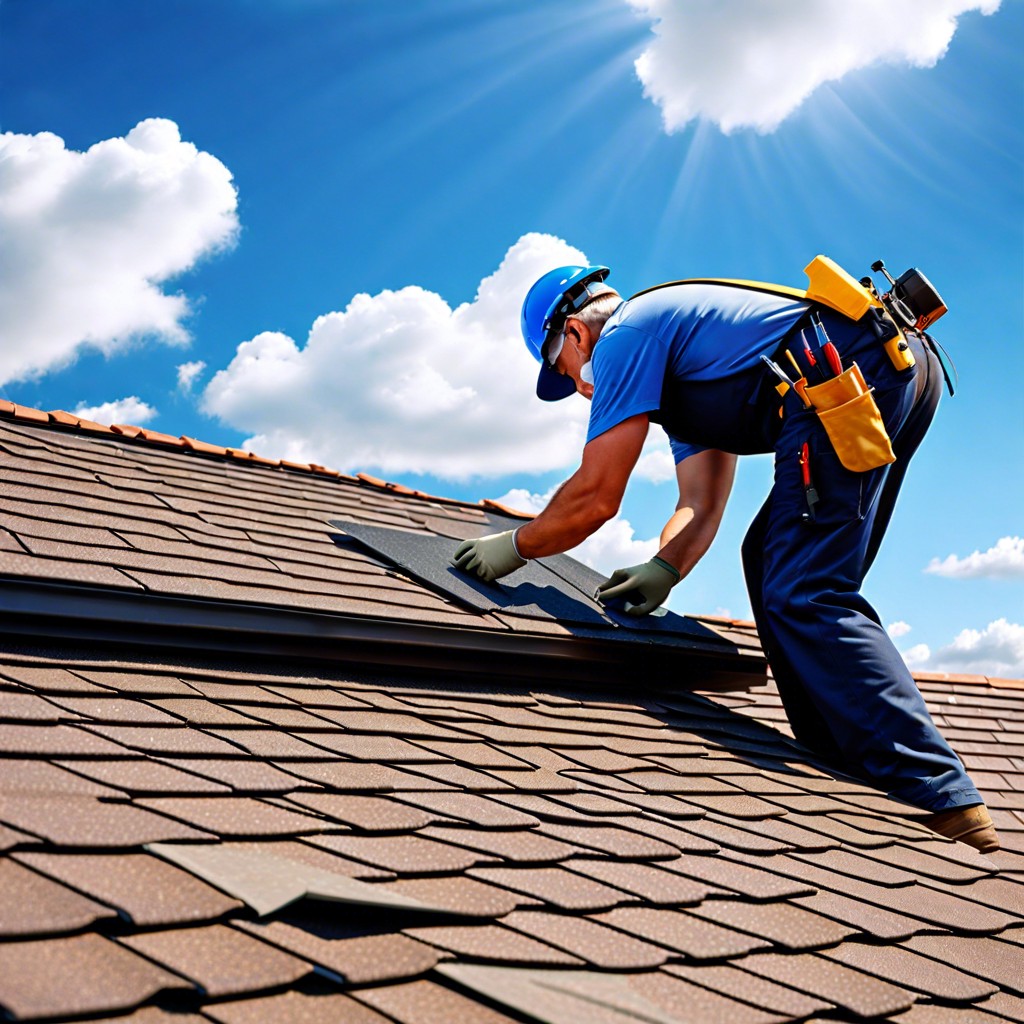Last updated on
Maintaining the efficiency of solar panels begins with proper cleaning—here’s how to do it safely and effectively.
Key takeaways:
- Regular cleaning is essential for maximum solar panel efficiency.
- Frequency of cleaning depends on location, climate, and installation angle.
- Use gentle methods like rinsing, soft brush, and mild soap.
- Prioritize safety measures, including using a sturdy ladder and fall protection.
- Call a professional for complex installations or electrical issues.
Why Do Solar Panels Need to Be Cleaned?

Dirt, dust, bird droppings, leaves, and other debris can accumulate on solar panels, reducing their ability to absorb sunlight. This layer of grime can obstruct sunlight and diminish the panels’ efficiency, sometimes by up to 25%, making regular cleaning essential to maintain optimal performance.
Moreover, in areas with heavy pollution or frequent bird activity, the impact on solar efficiency might be more pronounced, reinforcing the importance of keeping panels clean to ensure a maximized energy output from your solar investment.
How Often Do Solar Panels Need to Be Cleaned?
Regular maintenance of solar panels is crucial for optimal performance. The frequency of cleaning depends on several factors such as location, climate, and the angle of installation.
In areas with minimal dust and pollution, a biannual cleaning may suffice. Conversely, in environments prone to heavy dust, pollen, or bird droppings, a quarterly or even monthly schedule may be necessary.
Monitoring the power output is an effective way to gauge the need for cleaning; a notable decrease in efficiency often indicates that it’s time to remove the accumulated debris.
Additionally, seasonal considerations are important: after pollen-heavy springs or dusty summer droughts, a cleaning can help restore efficiency.
It is essential, however, to balance the potential gain in power output with the cost or effort of cleaning.
Methods for Cleaning Solar Panels
Maintaining the efficiency of solar panels hinges on their cleanliness. For optimal results, a periodic wash is essential.
Start by gently rinsing the surface with a garden hose to eliminate loose dirt and debris. For more stubborn grime, a soft brush or squeegee attached to a long handle, paired with a bucket of soapy water, can be used. It’s crucial to choose a mild, biodegradable soap to prevent any harm to the panels or the surrounding environment.
Avoid high-pressure water sprays as they can damage the panel’s surface, and steer clear of abrasive sponges or harsh chemicals that could leave scratches or residue. For the finishing touch, rinse the panels thoroughly with clean water to remove any remaining soap and reduce the risk of streaks upon drying.
Cleaning should ideally be performed in the early morning or late afternoon to avoid the heat of midday, which can cause water to evaporate quickly and leave streaks. Overcast days are also advantageous, as they can prevent quick drying and streaking. For those with tilted panels, an added benefit is that rainfall can assist in the cleaning process, though it’s not a substitute for a thorough wash.
Automated cleaning systems are also available, offering hassle-free maintenance through mechanisms like robotic cleaners or sprinkler-like systems. These can be especially useful in dry, dusty climates where frequent cleaning is required.
Regular inspection of the panels during cleaning is recommended to ensure their longevity and performance. It’s crucial to keep an eye out for any damage that may necessitate professional repair.
Safety Measures
Prioritize personal safety when embarking on solar panel maintenance to prevent accidents. Adhere to these guidelines:
- Utilize a sturdy ladder: Ensure it’s properly set up and stable before climbing.
- Employ fall protection: If roof access is necessary, use a harness and secure it to a solid anchor point.
- Avoid slippery surfaces: Schedule cleaning for a dry, calm day to reduce the risk of slipping.
- Shut down the system: Before cleaning, turn off the solar panel system to mitigate electrical hazards.
- Wear appropriate clothing: Long-sleeved shirts, gloves, and eye protection are advisable to protect against cuts or exposure to cleaning agents.
- Use a buddy system: Cleaning with a partner ensures immediate assistance in case of any emergency.
By rigorously following these safety measures, you can safely maintain the efficiency of your solar panels.
When to Call a Professional
In certain situations, it’s best to entrust the cleaning of solar panels to trained professionals. Complex installations, safety concerns, or warranty stipulations typically warrant expert attention.
– Steep rooftops or multi-story buildings may pose fall risks; professionals are equipped with the necessary safety gear and training to navigate these dangers.
– Solar panels with electrical issues or damage should be handled by a technician to avoid the risk of electrical shock or voiding warranties.
– Some manufacturers have specific maintenance requirements; consulting with a professional ensures these guidelines are followed, preserving the panel’s warranty.
– Accumulated or stubborn grime, such as tree sap or bird droppings, may require specialized cleaning agents or methods best handled by an expert.
– Monthly or annual cleaning contracts with a professional service can be convenient for those with busy schedules, ensuring regular maintenance without personal time investment.




